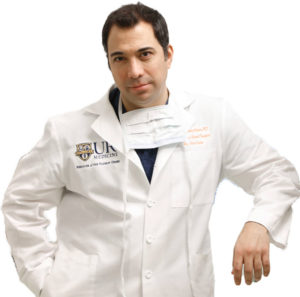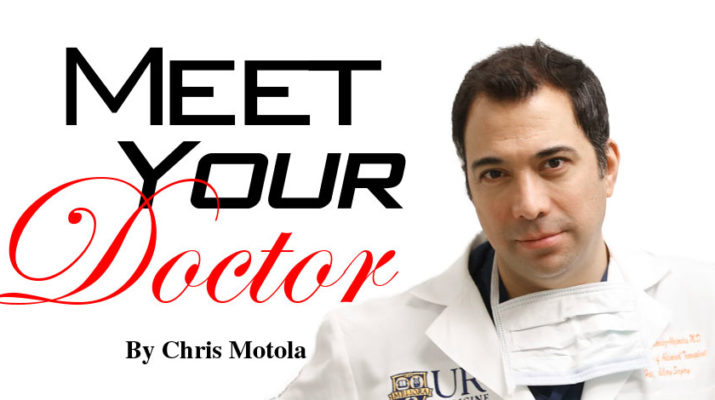Chief of transplantation at Strong: He and his team perform 26 life-saving transplants through coronavirus pandemic months
By Chris Motola

Q: COVID-19 has had a major impact on medical procedures this year. You, however, have been performing some of the riskiest procedures during this time—solid organ transplants. What’s that been like?
A: It was around mid-March that the hospital started making some changes in procedure because of the pandemic — internal changes and modifications. As you probably know, one of the biggest recommendations from the state was to stop elective surgeries. However, there are essential surgeries that we still have to do. I wear two hats where I work. The first is transplantation. I am the chief of abdominal transplantation at the University of Rochester, and am personally involved with liver transplants, which is a life-saving procedure for patients with liver failure. We can’t put that on hold; we don’t know if they’ll have another chance.
Q: And your other role?
A: The other area I work is with liver cancer, not necessarily related to transplant, but these patients need surgery and if we wait or hold for months, it might spread to other organs and be too late to operate and give them a better quality of life and chance at survival.
Q: How did you resolve the need to perform these procedures with the risks from COVID?
A: There were a lot of conversations with the institution, and we were able to implement and continue to implement. That moment in March and April, there were a lot of things we didn’t know about the virus. There are still a lot of things we don’t know, but we know more than we did. As you may know, with transplantation you need more than just a surgeon — there’s a huge team surrounding the patient, a lot of different specialties involved. So we were able to set up and get the necessary PPE to do these operations. They implemented a plan to set up an area where patients with COVID would be placed and kept isolated, and non-COVID areas in the ICUs free of COVID. There were a lot of structural changes in the building. It’s been working well.
Q: How did that turn out?
A: Interestingly, I have to say that our practice in Rochester has been pretty strong — kidney, liver, and heart transplantation — but since March 17, we have been extremely busy, especially in liver transplantation. We’ve had 26 [transplants] since then. You would expect a decrease in donations, and that’s happened in a lot of other cities, but in Rochester we’ve been lucky in being able to get organs. We’ve more than doubled our number of liver transplants in a short period of time.
Q: Has your team been able to stay healthy?
A: We’ve been following guidelines to avoid getting infected. No one on our team has tested positive yet despite working in this environment and how busy we’ve been in the operating room.
Q: Have you worked on any patients with COVID?
A: I do have an interesting story that’s worth mentioning. We had a very sick patient who was transferred from the Southern Tier. This patient needed an urgent liver transplant, within 72 hours or they were likely to pass away. We did a proper workup on the patient while the patient was on the urgent wait list. The patient was very lucky and got a very good organ donor. It was a difficult operation and took about nine hours. Twenty-four hours later, the patient started moving his arms and opening his eyes. Three or four days after the operation, the patient was communicating with his family on social media, but he started having some respiratory issues, shortness of breath. The patient turned out to be COVID-positive. When the patient was transferred, he was COVID-negative according to the test. Whether the first test was a false negative or whether the patient acquired the virus within our hospital, we don’t know, but we moved quickly to isolate the patient, who needed to go back on ventilation shortly after coming off it from the surgery. And transplantation patients are on immunosupressants, so the prognosis was not good. The risk of mortality, according to the New England Journal of Medicine is high — there’s a mortality rate of 40% for patients who have COVID around the time of surgery. And this wasn’t a simple surgery, it was a liver transplant. When you factor in the risks from that, you’re probably looking at closer to 75-80% [mortality rate]. On top of this, we know the virus creates clots, so the patient needed anticoagulation medication, but this is after surgery where you put a lot of veins and arteries together. So there’s a lot of bleeding, and the patient had needed multiple transfusions. So after you factor that in, you’re looking, according to statistics, at a mortality rate approaching or even higher than 100%. The patient’s doing phenomenal. He’s back home, walking, enjoying life with his family. The reason I wanted to share this is because we, as surgeons, healthcare workers, we live around this virus. There’s a lot of things we can do. We need to be conscious that these things can happen, but when we work together, we can achieve good results. Despite all those risk factors, we have a beautiful story at the end.
Q: Is the virus a complicating factor for patients who have had transplantations in the past?
A: We also have some patients who received kidney or liver transplants from months or years ago who were infected. The vast majority of these cases were managed at home, and they were able to clear the virus like any other patient who contracted the virus. A handful required treatment in the hospital and were treated successfully.
Lifelines
Name: Roberto Hernandez-Alejandro
Position: Chief of transplantation and liver cancer surgery at Strong Memorial Hospital
Hometown: Mexico City, Mexico
Education: Universidad de La Salle
Affiliations: Strong Memorial Hospital; Western University (London, Ontario)
Organizations: International Liver Transplant Society; Americas Hepato-Pancreato-Billiary Foundation (AHPB); American Society of Transplant Surgeons; United Network for Organ Sharing
Family: Wife (Ximena); Children (Julia, 18; Victoria, 17; Paulino, 13)
Hobbies: Travel; supporting children’s sports; reading; exercise; watching and feeding birds

